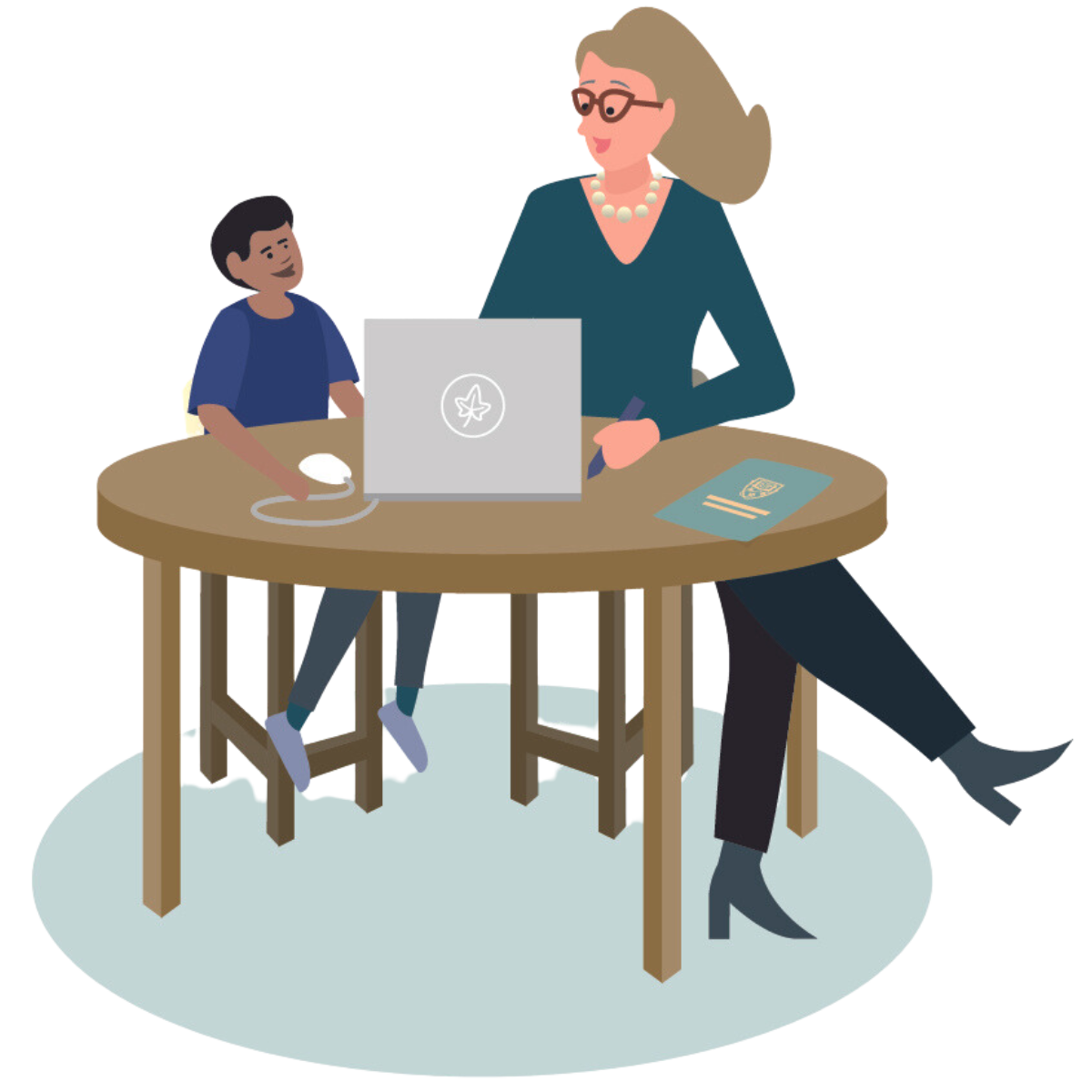Expert Insights
Homeschooling Requirements in the UK (2025)
Published 23rd February 2024

Homeschooling Requirements in the UK
The number of children being homeschooled in the UK has increased significantly in recent years. A survey by the Association of Directors of Children’s Services estimated there were in the region of 57,800 children homeschooled in 2018, while the 2023 Government school census gave a figure of 86,000.
The reasons parents consider educating their child at home are varied whether dissatisfaction with the school system; freedom from school timetables and term dates; bullying; special educational or health needs, or a short-term intervention. Whatever the reason, effective homeschooling is not something that can be improvised. It requires careful planning to ensure your child is receiving the best education possible.
This guide will help you navigate the legal and practical aspects of homeschooling, highlight the support that is available for parents considering this as an option and help you make an informed choice.
Here at Ivy Education, we have experienced tutors, skilled at providing bespoke online and in-person one-to-one homeschooling. We can help you devise a curriculum that matches your child’s individual needs and ensures a broad and rich education.
Whilst every child has a right to an education, how this is provided is the responsibility of the parents, not the state. You can educate your child at home either full-time or part-time (often called flexi-schooling). Children can move between home education and school at different stages of their education.
If your child is already attending school, it is important to notify the local authority if you are planning on educating them at home.
Compulsory school age in England and Wales is from the first of either 31 August, 31 December or 31 March, which occurs after they become five years old. It remains compulsory until the last Friday of June in the academic year in which they turn 16. Compulsory school age in Scotland is similar, with slight differences in starting and leaving dates.
If your child is already attending school, you should write to the headteacher asking for their name to be removed from the register, and they are obliged to agree to your request. They do, however, have the right to refuse requests for part-time registration. Schools are not obliged to agree to flexi-schooling arrangements, where your child is registered at a school but only attends part-time. As interest in homeschooling grows, however, some schools are developing a curriculum to support flexi-schooling.
If your child has not yet started school and you have not been offered a place anywhere, you do not need to inform anyone. In Scotland, if your child has already been attending a mainstream school, you need to have permission for the local education authority to withdraw your child.
There is no legislation that deals with home education specifically, however the Education Act of 1996 provides that:
The parent of every child of compulsory school age shall cause him to receive efficient full-time education suitable –
(a) to his age, ability and aptitude, and
(b) to any special educational needs he may have,
either by regular attendance at school or otherwise.
Home education falls under the or otherwise wording.
Although education is compulsory for children from the ages of 5-16, you do not have to send your child to school. Parents who choose to home school, do not need to follow the national curriculum, but can devise their own. They can employ tutors or use online tuition to assist in providing a suitable education, but there is no legal requirement to do so.
In England and Wales you are not obliged to inform the local authority, unless your child is attending school due to a school attendance order, but they may initiate contact with you.
One of the reasons parents opt for homeschooling is if their child has a special educational need and they cannot find a suitable school place to meet their child’s needs.
If your child already attends a special school, you will need to seek permission from the council to educate them at home. Children with an Education Health and Care plan enrolled at a mainstream school do not need permission from the local authority.
The guidance above applies to England and Wales. In Scotland and Northern Ireland, it may be necessary to receive local authority permission to home school your child.
Where parents are divorced, either parent with their name on the child’s birth certificate can homeschool without the other parent’s consent. The decision can however be challenged in court.
The Education Act requires that children are offered a full-time education, but there is no legal definition of full-time. Home education does not have to follow normal school term times or hours. There is often much more one-to-one contact within homeschooling, and it may take place outside of normal school hours.
As parents choosing homeschooling, you have the flexibility to choose the educational approach that fits with your personal philosophy and meets the needs of your child. The National Curriculum can be used as a guide, or you can design a curriculum tailored to your child’s interest. The guidance from the Department of Education does however state “parents should at least be able to quantify and demonstrate the amount of time for which your child is being educated”.
There is likewise no definition of a “suitable” education other than it must be appropriate to the age, ability and aptitudes of the child and any special educational needs.
As parents, you will want to bear in mind that there is a minimum standard of education which will enable your child, when grown-up, to function fully within society. Local authorities may assess suitability by judging against minimum expectations for literacy and numeracy.
Whilst there is no legal requirement to provide evidence of your child’s learning progress, local authorities may want to discuss your homeschooling plans as they have a statutory duty to identify children who might not be receiving a suitable education. We would always recommend complying with such requests, as the local authority may form its own conclusions otherwise.
Local authorities will have their own policies on elective home education, usually available on their websites, and it is advisable to familiarise yourself with the procedures in place in your locality. Evidence can be provided through home visits, meetings outside of the home, explaining your educational philosophy or providing written evidence.
As already mentioned, you do not need permission from any authority to start homeschooling. Local authorities may expect that parents or other significant carers are consistently involved; a child’s needs, attitudes and aspirations are recognised; there are opportunities for the child to be stimulated by their learning experiences, and there is access to resources and materials to provide home education.
Depending on local regulations if any concerns arise about the suitability of education offered, or about a child’s welfare, the local authority may serve a notice (known as a s.437(1) notice) requiring that you satisfy them that your child is receiving a suitable education. The local authority must consider any response parents make, and if it is not satisfied, it has a legal obligation to issue a school attendance order which will name a specific school and require you to register.
A local authority cannot use its safeguarding powers to insist on visiting a child’s home simply to monitor homeschool provision. However, they have powers under the Children Act, if they have safeguarding concerns, to apply for a court order granting them the right to contact with a child.

You may wish to enrol your child back to a traditional school to access public exams such as GCSEs and A Levels. It is possible however for homeschooled children to take the exams at an exam centre, without school registration. It is then the parents’ responsibility to register their child and to cover the associated costs. Exam centres may be based at local schools or colleges. The Joint Council for Qualifications, JCQ, has a searchable database to help you find centres in your locality.
Ivy Education has experienced educational consultants who can discuss the options available and help you navigate the process of finding a centre and registering for exams.
If you decide to homeschool your child, you take on full financial responsibility. This includes the costs of any public examinations. Local authorities can provide discretionary support in the form of free or discounted admission to their sports facilities; materials which support the national curriculum; information about educational visits and work experience. Parents can find out from their local authority what is available in their area.
In Scotland, children may be eligible for an Education Maintenance Allowance once they reach the age of 16. They will need to take part in a learning agreement / action plan with the local council.
Legal requirements have been briefly outlined in this guide, but for full information consult the Department of Education’s guidance on Elective Home Education.
12.2Plan a curriculum that ensures progress in core areas such as literacy and numeracy but allows for your child’s interests and aptitudes to guide their learning. Include opportunities for them to be creative and to explore different areas of study.
12.3From the outset, be clear about your goals. Do you want your child to return to school at some point, perhaps for GCSEs or A Levels? Or will you be arranging for them to sit public exams elsewhere. Is this a short-term solution to a specific issue, or a long-term philosophy.
12.4How you structure your days is up to you, but having a daily timetable of learning and recreation will ensure you work towards your goals.
12.5There is a bewildering array of educational resources available, both online and in real life. Depending on the age, interests and aptitude of your child make full use of what is offered. Our tutors at Ivy Education can help steer you towards the best resources out there.
12.6Make the most of the flexibility you have to incorporate real-life learning opportunities, whether that is gardening, volunteering, learning to sew or manage a small budget.
12.7Field trips – to galleries, museums, community projects, libraries, parks, the countryside - provide a rich seam of enrichment activities for all levels of learning.
12.8Group activities can be fun for your child, while you can share ideas and inspiration with other like-minded parents. There is a growing number of groups of homeschooling parents all over the country.
12.9A key benefit of homeschooling is that you can develop a curriculum tailored specifically for your child. In turn, personalised learning, utilising their interests, can ensure children are more engaged.
12.10Find a way to ensure you are regularly assessing your child’s progress, whether informally or through assessments such as those offered by Ivy Education and our fabulous tutors. This will help you be confident that your child is making good progress.
12.11Keeping records will not only provide evidence should you require it, of the education you are providing, but will help ensure coverage of exam specifications and track progress.
12.12Make sure you keep an eye on any new legislation as well as changes in curriculum specifications – especially if you are working towards GCSE or A Level exams. New technologies and AI are advancing at a terrific rate, so make sure you are at the cutting edge.
12.13The internet is a valuable source of information and interactive learning resources but make sure you are balancing the use of screen time with opportunities for real life discussion, reading, educational visits, sports and opportunities for socialising.
12.14The ability to focus on self-directed learning is crucial to success throughout life. Following a curriculum that is tailored to their interests could be the ideal way to encourage our child to deepen their learning independently.
12.15Professional guidance can help ensure your programme is not only unique and personalised but is meeting your goals and equipping your child for the future.
The decision to homeschool your child is not one that is taken lightly. Homeschooling with Ivy Education, our students make astonishing academic progress, develop emotionally and socially, and follow their own path to success wherever they are.
Whether you need a full team of tutors to create a personalised, comprehensive programme, a live-in mentor to direct and complement existing arrangements, or an expert to join you on holiday, Ivy Education is here to help.

While there is no legislation dealing directly with homeschooling, the 1996 Education Act specifies that children must receive an education that is full-time, efficient, and suitable for their needs
You do not need permission to homeschool your child in England and Wales, unless they are already registered with a school. In Scotland, the law requires you to request permission.
No, you do not need to follow the National Curriculum, although for many homeschooling families it remains an important source of information.
Homeschooling can provide lots of opportunities for social interaction. This can include involvement in voluntary or community groups; sports; youth clubs and activities such as art and drama groups, and group lessons whether online or in real life.
Parents take on full financial responsibility for their children’s education if they decide to homeschool. In Scotland, 16-19 year olds may qualify for an Education Maintenance Grant.
The short answer is “yes”. Depending on your reason for homeschooling, you may wish your child to return to a traditional school environment to sit public exams, or to benefit from team sport opportunities.
If you are not sure where to start, or feel overwhelmed by the task, then speak to us at Ivy Education. Not only do we have experienced tutors who can work alongside you and help you realise your plans, we have consultants who can advise on all aspects of homeschooling.
Home schooling is a real option open to all parents; you have the right to choose how your child is educated. As the homeschooling community grows, there are more and more resources available to help you research and prepare for a successful homeschooling journey.
At Ivy Education, we would be delighted to be part of that journey with you. Get in touch to learn more about our homeschooling services.











